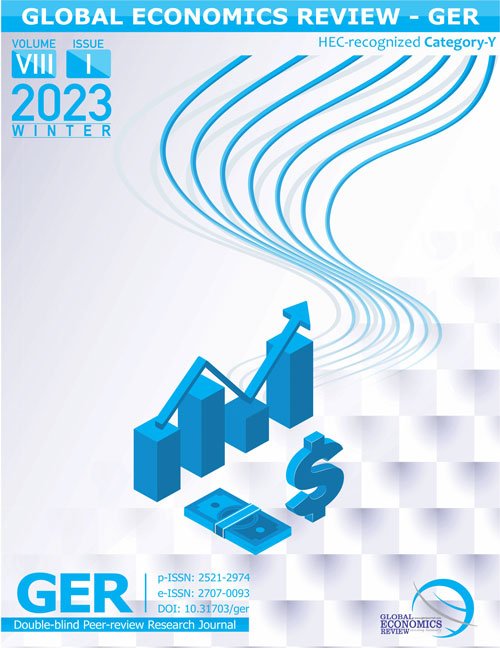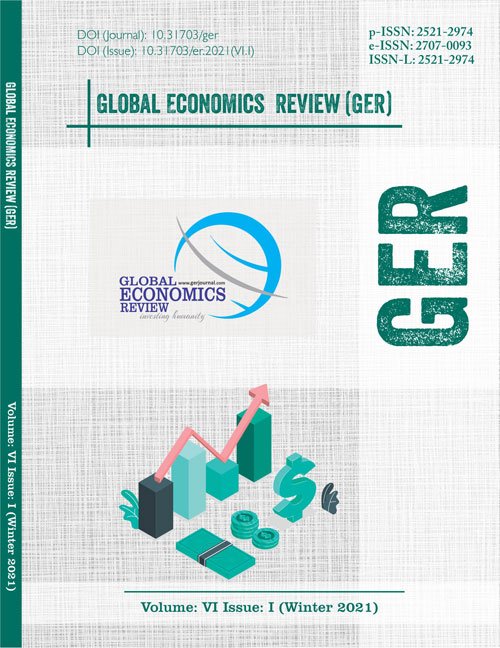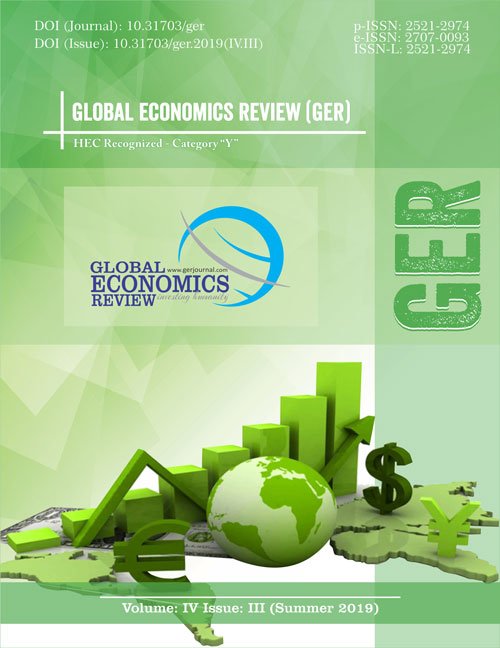01 - Impact of Industrialization, Urbanization and Energy Consumption on Environmenta
http://dx.doi.org/10.31703/ger.2019(IV-II).0110.31703/ger.2019(IV-II).01 Published : Jun 2019
-
Industrialization and Urbanization are the important pillars for economic growth in a country however, a threat to the natural environment. The major aim of this study is to empirically analyze the effect of industrialization, urbanization, and energy consumption on the environment in India. Annual data for the span of 1975-2018 is analyzed. Augmented Dickey-Fuller (ADF) and (PP) tests are adopted... Details
-
Urbanization; Industrialization; Energy use; Linear regression model.
-
(1) Sohail Farooq
Assistant Professor,Department of Economics,Hazara University Mansehra, KP, Pakistan.
(2) Shabana Parveen
Assistant Professor, Department of Economics,Hazara University Mansehra, KP, Pakistan.
(3) Habib Elahi Sahibzada
Assistant Professor, Department of Education,Hazara University Mansehra, KP, Pakistan.
02 - Testing the Reliability and Existence of IS-LM Model for Pakistan
http://dx.doi.org/10.31703/ger.2019(IV-II).0210.31703/ger.2019(IV-II).02 Published : Jun 2019
-
The IS-LM model was considered indispensable and had great importance and recital for macroeconomic phenomenon at theoretical as well empirical analysis since 1960s. Now a days the applications of IS-LM model has been greatly restricted to few situations depicts losing the fame. However it has been a crucial part of the basic principles and manuscripts of macroeconomics long since 1960s. Observing... Details
-
IS-LM model, planned expenditure, Descriptive Statistics, ARDL approach.
-
(1) Gulzar Ali
Assistant Professor,Department of Economics,Islamia College Peshawar, KP, Pakistan.
(2) Said Zamin Shah
Assistant Professor,Department of Economics,Islamia College Peshawar, KP, Pakistan.
(3) Ghulam Mustafa
Assistant Professor,Department of Economics and Business Administration,Division of Artsand Social Sciences, University of Education, Lahore, Punjab Pakistan.
03 - Reinforcing Risk Perception to Induce Exercise Intention: Role of Systematic Int
http://dx.doi.org/10.31703/ger.2019(IV-II).0310.31703/ger.2019(IV-II).03 Published : Jun 2019
-
The study examined the relationship between systematic interaction, fear appeals, and exercise intention using group-centered and participatory approaches. The longitudinal experimental design was used to understand the phenomenon of fear appeals (risk perception) for adopting sustained physical activities. The sample comprised two treatment conditions i.e. experimental group and control group to ... Details
-
Fear Appeals, Risk Perception, Systematic Interaction, Behavior Change
-
(1) Farooq Ahmad
Assistant Professor,Faculty of Management & Social Sciences,University of Okara, Okara, Punjab, Pakistan.
(2) Muhammad Nawaz Qaisar
Independent Researcher
(3) Syed Ali Raza Hamid
Assistant Professor, Hamdard Institute of Management Sciences,Hamdard University, Islamabad Campus, Pakistan.
04 - Determination of Interpersonal Relations, Leadership Style, Communication of Wor
http://dx.doi.org/10.31703/ger.2019(IV-II).0410.31703/ger.2019(IV-II).04 Published : Jun 2019
-
This research was conducted to see the determination of interpersonal relationships, leadership styles, and communication against work productivity with team cooperation as intervening variables in the general section in the Bintan Regency Regional Secretariat. The respondents in this study were civil servants and non-permanent employees, a general part in the Regional Secretariat of Bintan Regenc... Details
-
Interpersonal Relationships, Leadership Style, Communication, Team Cooperation, Work Productivity.
-
(1) Maisyarah
Faculty of Economics, Batam University, Riau Islands, Indonesia.
(2) Chablullah Wibisono
Faculty of Economics, Batam University, Riau Islands, Indonesia.
(3) Bambang Satriawan
Faculty of Economics, Batam University, Riau Islands, Indonesia.
05 - China-Pakistan Economic Cooperation: Trade, Investment, Energy, Infrastructure a
http://dx.doi.org/10.31703/ger.2019(IV-II).0510.31703/ger.2019(IV-II).05 Published : Jun 2019
-
This research paper presents an analytical overview of the ChinaPakistan Economic Cooperation Under the umbrella of China-Pakistan Economic Corridor. This research study has employed the qualitative method in which secondary sources of data have taken from the existing literature, published and unpublished research works and primary data was collected by conducting interviews of International Rela... Details
-
Baluchistan, China, CPEC, Economic Cooperation, Economic Interdependence, Gwadar Port, Pakistan
-
(1) Sobia Jamil
PhDScholar, Faculty of Law and Interntional Relations, University Sultan Zainal Abidin, Kuala Terengganu, Malaysia.
(2) Muhammad Shoaib Malik
Assistant Professor, Department of Pakistan Studies and History, National University of Modern Languages (NUML), Islamabad, Pakistan.
(3) Syed Ali Shah
Assistant Professor, Department of Pakistan Studies, AWKUM, KP, Pakistan.
06 - Capital Structure of Chinese Firms Across different Sectors: Does Ownership Stru
http://dx.doi.org/10.31703/ger.2019(IV-II).0610.31703/ger.2019(IV-II).06 Published : Jun 2019
-
This study estimates the effect of state ownership and other firmspecific variables on the capital structure of Chinese listed industries operating in different sectors. State ownership and leverage are both negatively and positively associated. The negative association of state ownership with leverage was found in construction, metals and metal products, services and transport sectors, while posi... Details
-
Capital Structure, Corporate Ownership, State-Owned Enterprises, China.
-
(1) Muhammad Yusuf Amin
Lecturer, Institute of Business Studies and Leadership, Abdul Wali Khan University Mardan, KP, Pakistan.
(2) Amanat Ali
Assistant Professor, School of Economics, Quaid-i-Azam University, Islamabad, Pakistan
(3) Bashir Khan
PhD Scholar, School of Economics, Quaid-i-Azam University, Islamabad, Pakistan
08 - How to address the Puzzle of Military Intervention into Politics in Developing D
http://dx.doi.org/10.31703/ger.2019(IV-II).0810.31703/ger.2019(IV-II).08 Published : Jun 2019
-
This paper discusses why military intervention takes place in developing democracies by taking Pakistan as a case study with a focus on theoretical intricacies. There may be different theoretical explanations as to why the military imposes martial laws and takes the affairs of the state into their own hands. It discusses Samuel P. Huntington's Professionalism, Michael Desch's Structural Theory, ba... Details
-
Military Intervention, Politics, Democracies, Pakistan
-
(1) Ayaz Ali Shah
Lecturer, Department of Political Science, Abdul Wali Khan University Mardan, KP, Pakistan.
(2) Shaukat
Lecturer, Department of Political Science, Abdul Wali Khan University Mardan, KP, Pakistan.
(3) Hina Malik
Demonstrator, Department of Political Science, Abdul Wali Khan University Mardan, KP, Pakistan.
09 - Macroeconomic Determinants of Inclusive Growth in Pakistan: An ARDL Approach
http://dx.doi.org/10.31703/ger.2019(IV-II).0910.31703/ger.2019(IV-II).09 Published : Jun 2019
-
There is increasing concern that growth in most part of the world in not distributed equitably. This is particularly the situation in Pakistan, where the economic growth is uneven and biased toward the affluent. This study aims to present empirical analysis to characterize the association between inclusive growth and its macro-economic determinants in Pakistan. In this context, the study employs a... Details
-
Inclusive Growth, Economic Growth, ARDL
-
(1) Vivek Anand
Assistant Professor, Isra University Hyderabad, Sindh, Pakistan.
(2) Muhammad Qasim Nizamani
Assistant Professor, Department of Media & Communication Studies, University of Sindh Jamshoro, Sindh, Pakistan.
(3) Farheen Qasim Nizamani
Assistant Professor, Department of Media & Communication Studies, University of Sindh Jamshoro, Sindh, Pakistan.
10 - CSR's Pattern and Trends within Multinational Enterprises Operating in China
http://dx.doi.org/10.31703/ger.2019(IV-II).1010.31703/ger.2019(IV-II).10 Published : Jun 2019
-
This study examines the trends of corporate social responsibility (CSR) dynamics within multinational enterprises (MNEs) operating in China. Secondary data was gathered from the published reports (e.g., annual, CSR, sustainability etc.) to measure the study variable with the help of global reporting initiative (GRI-G4) and compute a comprehensive CSR' outline. This study institutes the fundamental... Details
-
Corporate Social Responsibility; Multinational Enterprises; Emerging Economies; Global Reporting Initiative (GRI-G4); China
-
(1) Maqsood Hayat
Assistant Professor, Yunnan University of Business Management, Kunming, China.
(2) Shehzad Khan
Assistant Professor, Institute of Business Studies and Leadership, Abdul Wali Khan University Mardan, KP, Pakistan.
(3) Muhammad Faizan Malik
Assistant Professor, Institute of Business Studies and Leadership, Abdul Wali Khan University Mardan, KP, Pakistan.
11 - Shari'ah Legitimacy of the Existing Islamic Banks: As Artificial Person having L
http://dx.doi.org/10.31703/ger.2019(IV-II).1110.31703/ger.2019(IV-II).11 Published : Jun 2019
-
This paper studies the legitimacy of existing Islamic banking as an artificial person with the element of limited liability. This paper aims to analyze those arguments which are presented in favor of Islamic banking in the aforesaid ground. It examines these arguments to see whether the role of Islamic banks as an artificial person with the element of limited liability is consistent with the laid ... Details
-
Shari'ah Legitimacy, Islamic Banks, Artificial Person, Mudarabah
-
(1) Minhajuddin
Assistant Professor, Department of Economics, Faculty of Business % Economics, Abdul Wali Khan University, Mardan, KP, Pakistan
(2) Muhammad Sohail Alam Khan
Lecturer, Department of Economics, Faculty of Business % Economics, Abdul Wali Khan University, Mardan, KP, Pakista
(3) Brekhana Gul
Lecturer, Department of Economics, Faculty of Business % Economics, Abdul Wali Khan University, Mardan, KP, Pakista

 Volume X, Issue II (Spring 2025)
Volume X, Issue II (Spring 2025)  Volume IX, Issue III (Summer 2024)
Volume IX, Issue III (Summer 2024)  Volume IX, Issue II (Spring 2024)
Volume IX, Issue II (Spring 2024)  Volume IX, Issue I (Winter 2024)
Volume IX, Issue I (Winter 2024)  Volume VIII, Issue IV (Fall 2023)
Volume VIII, Issue IV (Fall 2023)  Volume VIII, Issue III (Summer 2023)
Volume VIII, Issue III (Summer 2023)  Volume VIII, Issue II (Spring 2023)
Volume VIII, Issue II (Spring 2023)  Volume VIII, Issue I (Winter 2023)
Volume VIII, Issue I (Winter 2023)  Volume VII, Issue IV (Fall 2022)
Volume VII, Issue IV (Fall 2022)  Volume VII, Issue III (Summer 2022)
Volume VII, Issue III (Summer 2022)  Volume VII, Issue II (Spring 2022)
Volume VII, Issue II (Spring 2022)  Volume VII, Issue I (Winter 2022)
Volume VII, Issue I (Winter 2022)  Volume VI, Issue IV (Fall 2021)
Volume VI, Issue IV (Fall 2021)  Volume VI, Issue III (Summer 2021)
Volume VI, Issue III (Summer 2021)  Volume VI, Issue II (Spring 2021)
Volume VI, Issue II (Spring 2021)  Volume VI, Issue I (Winter 2021)
Volume VI, Issue I (Winter 2021)  Volume V, Issue IV (Fall 2020)
Volume V, Issue IV (Fall 2020)  Volume V, Issue III (Summer 2020)
Volume V, Issue III (Summer 2020)  Volume V, Issue II (Spring 2020)
Volume V, Issue II (Spring 2020)  Volume V, Issue I (Winter 2020)
Volume V, Issue I (Winter 2020)  Volume IV, Issue IV (Fall 2019)
Volume IV, Issue IV (Fall 2019)  Volume IV, Issue III (Summer 2019)
Volume IV, Issue III (Summer 2019)  Volume IV, Issue II (Spring 2019)
Volume IV, Issue II (Spring 2019)  Volume IV, Issue I (Winter 2019)
Volume IV, Issue I (Winter 2019)  Volume III, Issue II (Fall 2018)
Volume III, Issue II (Fall 2018)  Volume III, Issue I (Spring 2018)
Volume III, Issue I (Spring 2018)  Volume II, Issue I (Fall 2017)
Volume II, Issue I (Fall 2017)  Volume I, Issue I (Fall 2016)
Volume I, Issue I (Fall 2016)